- Home
- Alaric Bond
Cut and Run: The Fourth Book in the Fighting Sail Series
Cut and Run: The Fourth Book in the Fighting Sail Series Read online
Cut and Run
by
Alaric Bond
Fireship Press
www.FireshipPress.com
Cut and Run - Copyright © 2011 by Alaric Bond
All rights reserved. No part of this book may be used or reproduced by any means without the written permission of the publisher except in the case of brief quotation embodied in critical articles and reviews.
Print ISBN: 978-1-61179-169-3
e.Book ISBN: 978-1-61179-170-9
BISAC Subject Headings:
FIC014000 FICTION / Historical
FIC032000 FICTION / War & Military
FIC047000 FICTION / Sea Stories
Address all correspondence to:
Fireship Press, LLC
P.O. Box 68412
Tucson, AZ 85737
Or visit our website at:
www.FireshipPress.com
1.0
Dedication
To David and Jean
Acknowledgements
Writing can be a lonely business, and those odd enough to indulge in historical fiction have an additional disadvantage; not only do they shut themselves off in another room, but a completely different time.
I have been lucky, and kept relatively sane, by the company of a group of people who have encouraged and supported me throughout Cut and Run, and other books. In no particular order they include Rick, Roy, Tom, Lesley, Mike, Mary, Susan, Malcolm, Linda, Ron and Dee. Some are tall ship sailers, others historians, still more readers or just plain nice folk. All have been ready with help and advice, and many I consider amongst my greatest friends and yet I have not met, or even spoken with any of them. The internet has many failings but this is one of its nicer aspects, and I am glad to be able to acknowledge and thank them now.
Table of Contents
Title Page
Copyright
Dedication
Acknowledgements
Chapter One
Chapter Two
Chapter Three
Chapter Four
Chapter Five
Chapter Six
Chapter Seven
Chapter Eight
Chapter Nine
Chapter Ten
Chapter Eleven
Chapter Twelve
Chapter Thirteen
Chapter Fourteen
Chapter Fifteen
Chapter Sixteen
Chapter Seventeen
Chapter Eighteen
Chapter Nineteen
Chapter Twenty
Epilogue
Endnotes
Selected Glossary
About the Author
Other Fine Books from Fireship Press
CUT AND RUN
To cut the cable for an escape. Also, to move off quickly; to quit occupation; to be gone. 1
Chapter One
It was raining outside the church. The couple paused for barely a moment, before hurrying down the damp stone steps and on to the street. Kate clutched at her dress with one hand, raising it out of the winter slime. The other, holding a winter posy, was firmly threaded through the arm of her new husband. They laughed as they hastened down the street, while from behind came the sound of their guests scurrying after them in the winter shower, and laughing as well.
“Ship an' Turtle,” Robert Manning shouted, pointing across the road at the dimly lit tavern slightly ahead. A crack of thunder heralded a further increase in the rain as they paused to wait for the crossing sweeper to carry out his work.
“Struth, Robert, I've never known such weather,” Tom King said, when he and the others had caught up with them. “It is worse than Biscay in the depths of winter!”
Manning turned to grin at him. “Perchance I shall be knowing that myself in a week or so.”
“Ready gents, ladies.” The crossing sweeper stood respectfully aside as the party crowded across the road. He wore a waxed canvas sheet tied tightly about his head, and his eyes were half closed, but one hand shot out instantly to catch the coin that Adam Fraiser threw to him. He slipped it neatly into his pocket, knowing the value without any need to look.
Inside, the tavern steamed with the smell of beer and wet clothing. Kate and her two friends brushed down the damp folds of their dresses while the men shook London rain from their dark blue uniforms. The water settled into raised puddles on the waxed wooden floor. It had been a bright, clear day when they arrived at the church and, despite being the middle of January, no one had thought to bring coats.
“Party in the name of Manning,” King told the young serving girl who was sent to greet them. A larger wedding breakfast would probably have warranted the landlord's appearance and attention, but this was a small affair, and they were shown through to a gloomy, bare room at the back of the building. Manning looked about, clearly disappointed, although his smile was quick to return when he caught Kate's eye.
“Could we have some light, miss?” Fraiser asked the girl. But at that moment the landlord entered, looking slightly harassed, and carrying a taper and a bundle of long yellow candles. “You will have to forgive me,” he said, glancing around at the guests. “We sprung a leak over the pantry, and I had to attend to it.”
The room and atmosphere grew lighter as the landlord bustled about between the pewter candelabras mounted on the wall. The girl found a white cotton cloth for the table, and the party began to seat themselves, self-consciously jostling for places. Soon, the first of the wedding breakfast was being laid out, and the landlord reappeared with four dark green bottles.
“Wine, sir?” he asked cautiously. “It was requested.” Manning opened his mouth to protest, but Michael Caulfield was there before him.
“My treat, Robert; I trust you will not object?”
The first cork was pulled with a spectacular popping sound that was quickly followed by a ripple of expectant laughter. Manning shook his head. The wedding, and their accommodation for the previous month or so, had been paid for by the last of Kate's father's money. He, of course, could not be present, the staff in the asylum who kept him safe were adamant on that point. Consequently, little had been spent on anything that was not essential. Manning could not guess how much the wine, which was almost certainly smuggled, would have cost—but he did know that as an unemployed naval lieutenant, Caulfield was hardly in a position to afford such a gesture.
“I am grateful to you, Michael,” he said, but on feeling Kate's gentle nudge, he corrected himself, “We both are.”
Caulfield grinned and nodded while the landlord quickly opened a second bottle, and soon all around were standing and toasting them. Manning raised his glass and touched Kate's with a gentle clink. They were both smiling now, radiantly, and quite without reserve.
“It is a shame that Sir Richard could not be here,” Kate said, effectively breaking the moment for her new husband. “He did say in his letter he might, 'though I know there are many matters to concern him since giving up the ship.”
“Plans to stand for Parliament, or so I gather,” Fraiser said, his tone completely flat. “A pity. We had a good crew in Pandora.”
Kate Manning's gaze swept about the naval officers at the table; all solid reliable men who had proved themselves in action, and yet it seemed they were no longer needed.
Clara, one of Kate's friends from her days as a midwife, spoke up suddenly. “I do not see why you cannot be reemployed. Surely, a boat will take only so long to mend?” Jane, Kate's other colleague, snorted into her glass as the room became strangely silent.
“Can you not wait for it to be fixed?” Clara added lamely.
“Sadly, madam, that is not
in our control,” Fraiser murmured. “Had the captain chosen to stay with the ship, we might well have been recalled. As it is, a new man is to take his place, and he will doubtless have his favourites.”
“And what if Sir Richard had taken another command?” Kate enquired.
Caulfield considered this for a moment, “Why then, he may have requested our presence. Instead, we have to bide our time and hope for a position elsewhere.”
“Aye, well, I for one shall not be waiting,” Doust said, sipping his wine reflectively. “The sea is for young men. I require something a mite less demanding for my old age.”
“Come, let us eat!” Manning said suddenly, conscious that the conversation was in danger of becoming maudlin. Indeed, the food was being ignored by all, though not a bad spread, considering the time of year. Plates of cold roast, bread, a raised pie, and potted meats were passed about, and soon the company settled into a quiet reverence as they began.
“But I gather you have secured yourself a berth, Robert?” Caulfield asked Manning as he cleared his plate for the first time and helped himself to more.
“Aye, joining the Company Bahadur, is that so?” Fraiser regarded him genially.
“Yes, the Honourable East India Company. I have signed for an Eastern trip—we are both going,” Manning added hurriedly.
“Both?” Doust started. “Only just got her wed, yet you are takin' the wee lassie to India?”
“Oh, it was my decision,” Kate said firmly, and King suppressed a grin How could it have been anything else? “We shall be gone by the end of the month,” she continued. “India, then on to China for a spell. It might be two years they reckons, but we should be the better for it when we return.”
“Aye, and that's a fact,” Doust nodded. “Providing you take care of yourselves.”
“In what capacity will you…?” Fraiser stumbled. He was about to enquire if she would be employed, or was simply travelling as a wife. A fair question, but somewhat artless when asked of a woman such as Kate.
“I shall be working my passage,” she said quickly. “It seems the time I spent in Pandora has served me well.”
“You were commended for it, so I believe,” Caulfield agreed. “Set a bad mess right, and with little trouble. Not many could have achieved as much.”
“That's as maybe, though the Navy would still not consider appointing a woman as a purser.” There was a harshness in her voice that was not lost on the officers.
“But John Company had other ideas?” Doust asked hopefully.
“Not exactly,” Kate replied. “Even in that quarter I met with opposition. A woman might be capable of the work, it seems, but it would be totally wrong to recognise the fact.”
“So officially you will be merely accompanying Mr Manning?” Fraiser asked.
“Yes, whilst in truth acting as an aid to the purser. A sort of Jack Dusty, I suppose, 'though it be a different position in a trader.”
“Aye, and you will have the Company's accounts to keep,” Caulfield spoke again. “That will be no easy task, I'll be bound.”
“Easy or not, I look forward to the prospect.”
“Indeed.” Caulfield switched his attention to Manning. “And what of you, Robert? Still the sawbones?”
“I will be assisting the surgeon, as before,” Manning replied. “There should be plenty of time for study. When I return, I hope to stand for my own ticket.”
“And no finer man can I think of for the position.” Doust drained his glass and accepted more from Caulfield.
“What ship?”
“Pevensey Castle,” Manning told Fraiser. “An eight hundred tonner. She has completed one India trip already. Just come down from Blackwall and is lading at Gravesend. Captain's a first timer, though.”
“Ah, a Guinea Pig!” Caulfield laughed.
Manning looked at him quizzically.
“They calls those who have yet to make the run to India, Guinea Pigs,” the lieutenant explained. “But I am glad to know the ship is a professional, even if you cannot say the same for her captain.”
“Oh, I gather him to be reasonably experienced; he certainly behaves that way. A former Navy man, or so I am told.”
“As often is the case,” Caulfield shook his head sadly. “An' more's the pity. Country's in the worst plight I can remember, and there are so many of us on half pay.” He caught Fraiser's eye and felt a little guilty. As a senior warrant officer the Scotsman would receive nothing at all until he secured a position in another ship.
Again there was a brief silence while the party took this in, before Manning continued, “Well, there are places in Pevensey Castle, of that I am certain.” Fraiser and Caulfield looked up quickly. “I've tried to interest Tom here, but he seems set for a life in white britches.”
“And I cannot blame him for that,” Caulfield said a little sadly. “The East India Company has many merits, but try as it might, it can never match the Navy.”
King was about to speak, but Manning was already asking of Fraiser.
“What of you, Adam?” The surgeons' mate asked. “Surely a trading vessel would fit with your thoughts?”
“Aye, it is something to be considered, but I have to agree, and would prefer to stay with the Navy. Your average merchant officer is of a separate mould, though not inferior in any way,” Fraiser added quickly. “Still, the two contrast more than most allow. On the whole, they have different temperaments, and values: maybe you will see what I mean when you have served awhile.”
“But Kate says you are against fighting,” Clara struck up again. She had already drunk two glasses of wine and was finding the taste very much to her liking. “Surely you would be happier on a merchant boat?”
Fraiser smiled. “Sadly lassie there is no guarantee of the peaceful life in a trading ship,” he said, emphasising the last word only slightly. “And as for my Christian faith, well, let us just say that there is more good to be done amongst the sinners than the saints.”
A wave of gentle laughter passed about the table.
“So that is the way of things,” Kate said suddenly. “We are off to see a new world, and this must be the last time we will all meet for two years or more. It is a sad thought.”
King wriggled in his seat. “Well, actually, there is one you might be seeing rather more of.” He had the attention of the whole table while he reached into his waistcoat and pulled out a letter. “Word came today, but I thought it better to save it until now.” Slowly, and in silence, the paper was unfolded. “I shall not bore you with the details, but I have notice from a certain captain accepting my application to be appointed as an officer under his command.”
“Employment!” Caulfield and Fraiser spoke almost as one, while they gazed at the note with a mixture of pleasure and envy.
“Why that is excellent news, Tom,” Kate beamed. “What ship is she?”
“Aye,” Manning was grinning as well. “And where bound?”
“She is the Pevensey Castle,” King told them. “And bound for India.”
* * *
Pevensey Castle was a queer-looking craft to anyone more used to looking at His Majesty's ships. Similar in size to a frigate, her hull appeared unnecessarily long, with a bluff bow and lines that would give far too much leeway when sailing close to the wind. They'd be lucky to see five knots from her, even in the hardiest of breezes. Moreover, she would be cranky, rolling like a drunkard and turning all the fat passengers green. She was low in the water, presumably well laden, although there was plenty amiss with her rig that required attending to before she sailed. A shout from one of the lightermen brought Johnston back to the real world.
“Won't take us more'n an hour to load this lot,” the man told him. “Then, you can be up and on your ways.”
It was the arrangement they had agreed upon—Johnston would help with the small cargo in return for a free passage to his new ship. He nodded, stuffed his ditty bag next to his sea chest, and moved towards the pile of barrels, crates, and sacks
that lay waiting to be loaded. Some were tagged, presumably ordered by individual officers or passengers, but the majority were shipboard stores.
“We will send nets down for the bread,” a voice from above informed them while the lighter bumped gently against the hull. “Barrels can be parbuckled.” Johnston looked round. The other lighterman was standing next to the parbuckle rails on the side of the hull. Two falls came down, and they began to attend to the first cask, looping the line about so that it could be dragged up the side and into the ship. The net began to descend from the fore and main yardarms, and soon Johnston and the first lighterman began to fill it. An hour was a generous estimation. Well within that time, he had swung his own chest into the last net, bid farewell to the crew of the lighter and clambered aboard the vessel.
“Thought you was a touch well dressed,” the boatswain's mate told him when he announced himself. “Marked for being aboard, are you?”
Johnston nodded. “Signed at Leadenhall Street the day afore yesterday.” He looked at the petty officer more carefully, and it was not an impressive sight. The man was short, but well built, with a mop of unruly brown hair that fell in front of his face. His jacket was tatty and decidedly unkempt, with a slight rip to the sleeve that had been allowed to run and fray. The trousers were no better, being heavily stained at the knees, and the varnished stiff hat, usually a proud mark of rank, was dented and shabby.

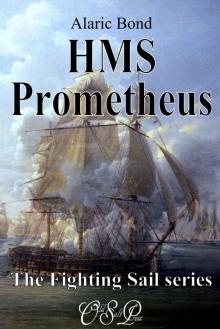 HMS Prometheus (The Fighting Sail Series Book 8)
HMS Prometheus (The Fighting Sail Series Book 8)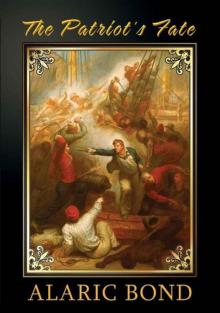 The Patriot's Fate
The Patriot's Fate The Blackstrap Station (The Fighting Sail series Book 9)
The Blackstrap Station (The Fighting Sail series Book 9)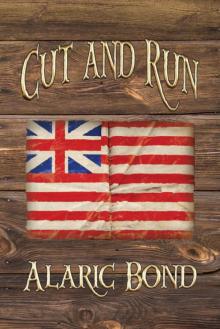 Cut and Run: The Fourth Book in the Fighting Sail Series
Cut and Run: The Fourth Book in the Fighting Sail Series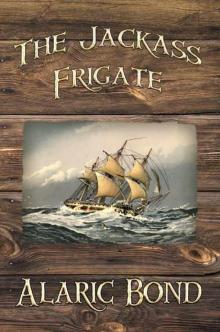 Jackass Frigate
Jackass Frigate The Torrid Zone (The Fighting Sail Series)
The Torrid Zone (The Fighting Sail Series)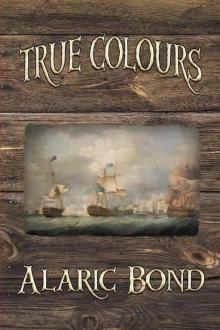 True Colours (The Third Book in the Fighting Sail Series)
True Colours (The Third Book in the Fighting Sail Series)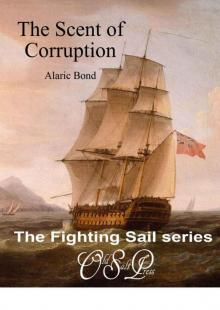 The Scent of Corruption (The Fighting Sail Series Book 7)
The Scent of Corruption (The Fighting Sail Series Book 7)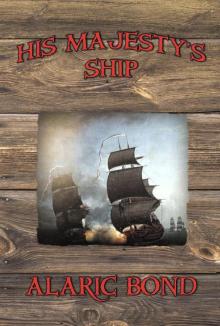 His Majesty's Ship
His Majesty's Ship